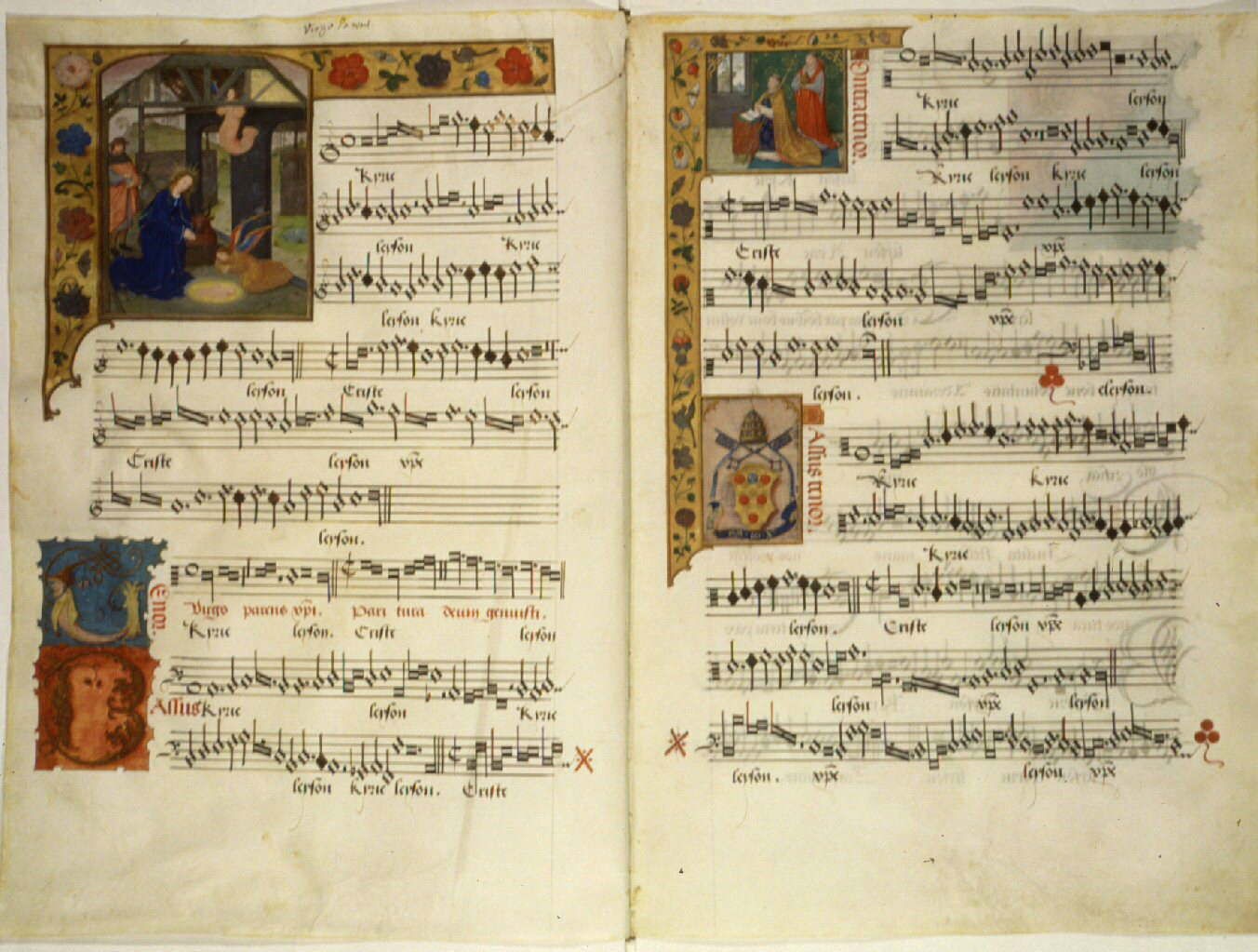Music as Intercessor: Music for St Cecilia's Day

Columbia University's Collegium Musicum presents its fall 2006 concert: Music as Intercessor: Music for St Cecilia's Day.
Music Director, Sean Parr
Program
- Welcome to all the pleasures - Purcell
- Brett Umlauf, Lauren Schaffel, Amber Youell, Nick Vogt, Nicholas Frisch
- In the midst of life - Purcell
- Susanne Knittel, Katherine Soper, Micki Kaufman, Dave MacLeod
- Suite in G major - Maurice Greene
- Wil Smith
- O God thou hast cast us out - Purcell
- Kate Smith, Katherine Soper, Micki Kaufman, Nick Vogt, Alberto Bosco, Nicholas Frisch
- Lord, how long wilt thou be angry? - Purcell
- Ursula Kwong-Brown, Alberto Bosco, Dave MacLeod
- Overture, from Begin the song - John Blow
- Welcome ev'ry guest - Blow
- Alina Roitstein
- Me, O ye gods - Purcell
- Kate Smith, Elena Megalos
- No, resistance is but vain - Purcell
- Brett Umlauf, Amber Youell
- War begets poverty - Richard Brown
- In grateful chorus - Johann Pepusch
- I was glad - Purcell
- Voluntary in G minor - Greene
- Meghann Wilhoite
- Remember not Lord our offenses - Purcell
- Hear my prayer, o Lord - Purcell
Program Notes
This concert’s program originated while I studied odes to St. Cecilia, patron saint of music. Finding Henry Purcell’s 1683 Ode to St. Cecilia, Welcome to all the pleasures, led to an inspiring exploration of the composer’s oeuvre. In addition to finding many musical gems by Purcell and his contemporaries, I was struck by how many pieces used music as an intercessor, an intermediary between humanity and something more powerful or beguilingly enigmatic. Not all of the pieces on this program explicitly present music in this manner, but most do so implicitly, particularly in the case of the funereal sacred works that use music to heighten the textual pleas to God to a metaphysical level.
In structuring this program around this theme, I have attempted to mix the thematic arc with historically-informed performance practices. This program uses period musical techniques and gestures to paint the theme more suggestively, and in a way that is hopefully accessible to a twenty-first century audience. My friend and colleague, Brooke Bryant, has staged this concert with gestures culled from John Bulwer’s 1644 oratorical treatise, Chironomiaand Cesare Ripa’s 1593 emblem book, Iconologia. These sources depict poses and hand positions and their corresponding emotional thrust. While it is not likely that these gestures were actually employed in sacred works during Purcell’s time, our use of gesture helps to accentuate the overall affects of these pieces, performed tonight in the concert context, not a liturgical one. Brooke and I have collaborated in extending the staging to spatially represent the dramatic arc of the program, that is, changing the choir’s stance throughout to match the changing modes of musical mediation.
The concert begins with a straightforward courtly ode, taking the ode’s general celebratory function and mapping it to a literal welcome of you, the audience. In addition to exulting music, the ode serves to introduce secular and mythological musical associations that are revisited at the beginning of the second half. The composition and performance of Cecilia odes became a tradition in 1680s England, and this concert features music from three such odes: Purcell’s, John Blow’s Begin the song (1684), and Johann Pepusch’s The Union of the Three Sister Arts (1723). These odes were often performed on the feast day of St. Cecilia, November 22, or as afterpieces in theatrical venues.
After Purcell’s ode, the tone shifts to the more somber aspect of music as mediator between man and God. The verse anthem, “In the midst of life,” presents the bitter pains associated with death, leading to feelings of shame, reflected in the scattering of the choir during the full with verse anthem, “O God, thou hast cast us out.”
At the start of the second half, the choir has pushed aside penitential thoughts, preferring to delight in lighter concerns. John Blow’s welcome song leads to an indulgent pagan appeal in “Me, O ye gods.” The selfish desire for quietude is coyly denounced by the sopranos and altos in “No, no, no, resistance is but vain,” which is immediately mocked by the tenors and basses singing a popularizing catch about the paradox of war. Although Pepusch’s “In grateful chorus” seems to indicate the choir’s contentment, their positioning is still scattered, implying that it was a pretense, covering up unresolved yearnings to connect to a higher realm.“I was glad” presents the optimism that such a connection is possible and segues into the solemn hope that God will not remember offences. Finally, the scattering congeals to a unified, simple, and direct stance reflecting a deep-rooted acknowledgement of our shortcomings and the desperate hope to be understood in “Hear my prayer, O Lord.” The program theme of “Music as Intercessor” has evolved from invoking music in praise of music to scattered desolation to self-indulgence and finally to earnest, intense, and united cries to be heard. In a way, this program has played with history in attempting to provide the audience an actual intercession of sorts, a mediation between historical and modern musical experience.
Ensemble
Soprano
Susanne Knittel
Elena Megalos
Alina Roitstein
Lauren Schaffel
Kate Smith
Brett Umlauf
Ruth Weiss
Alto
Lillyrose Broccia
Emily Glass
Ursula Kwong-Brown
Katherine Soper
Nora Weber
Amber Youell
Tenor
Alberto Bosco
Micki Kaufman
Jonathan Valleau
Nick Vogt
Bass
Nicholas Frisch
Roy Han
Robert Hanning
Huck Hodge
Dave MacLeod
Eugene Sit
with
Violin
Ina Paris
Lucia Martinez
Viola
Nora Krohn
Cello
Harrison Hsu
Organ/Harpsichord
Louise Chernosky
Andrew Harringer
Huck Hodge
Meghann Wilhoite
